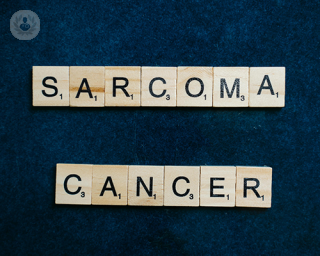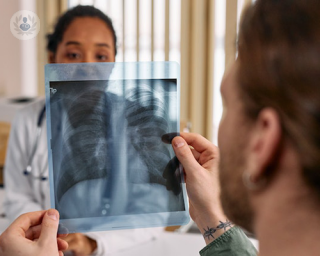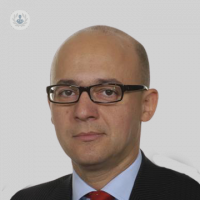Sarcoma is a malignant tumour in the bone or soft parts of the body. Among the different types of cancer, sarcomas are rare, about 1% of such cancers are diagnosed each year and only affect 4 or 5 people in a hundred thousand.

What is sarcoma?
Sarcoma is a type of cancer that can affect different types of tissue on any part of the body. It occurs in the connective tissue, which includes the fat, blood vessels, nerves, bones, muscles, deep skin tissues and cartilage. It most commonly affects the arms and legs. Sarcoma also appears in the stomach and intestines, behind the abdomen and in the female reproductive system.
What are the different types of sarcoma?
There are three main types of sarcoma:
- Soft tissue sarcoma – which develops in the supporting or connective tissue, such as the muscle, nerves, tendons, blood vessels and fibrous tissues.
- Bone sarcoma – cancer that starts in the bone, which affects the legs most commonly.
- Gastrointestinal stromal tumours (GIST) – develops in the gastrointestinal tract, which is a long tube that runs from the oesophagus to the anus, and includes the stomach and intestines. Most incidences of GISTs occur in the stomach and small bowel.
What are the symptoms of sarcoma?
In cases of soft tissue sarcoma, there are often no symptoms in the early stages. When symptoms do appear, they may include a noticeable lump or swelling that is usually painless. Bone sarcoma may be painful with or without a lump and it affects the long bones in the arm or the leg or pelvis. There may be blood in the stool or the stools will have a black, tarry appearance in cases of tumours in the gastrointestinal system.
How is sarcoma diagnosed?
If you notice a lump that is getting bigger you should visit your doctor. The doctor will conduct a medical examination. Imaging tests such as X-ray, ultrasound, a CAT scan or MRI will be required. A biopsy, which is the removal of a small amount of tissue for examination under a microscope, will confirm whether it is cancer.
What are the treatment options for sarcoma?
The treatment that you will need will depend on the stage and grade of cancer and the type of sarcoma that you have. Surgery is usually the first method used to treat sarcoma and the surgeon will remove the tumour. They will also remove an area of normal tissue surrounding the tumour too to reduce the risk of cancer coming back. In some cases, additional radiotherapy or chemotherapy is required.
09-10-2023Саркома
Sarcoma is a malignant tumour in the bone or soft parts of the body. Among the different types of cancer, sarcomas are rare, about 1% of such cancers are diagnosed each year and only affect 4 or 5 people in a hundred thousand.

What is sarcoma?
Sarcoma is a type of cancer that can affect different types of tissue on any part of the body. It occurs in the connective tissue, which includes the fat, blood vessels, nerves, bones, muscles, deep skin tissues and cartilage. It most commonly affects the arms and legs. Sarcoma also appears in the stomach and intestines, behind the abdomen and in the female reproductive system.
What are the different types of sarcoma?
There are three main types of sarcoma:
- Soft tissue sarcoma – which develops in the supporting or connective tissue, such as the muscle, nerves, tendons, blood vessels and fibrous tissues.
- Bone sarcoma – cancer that starts in the bone, which affects the legs most commonly.
- Gastrointestinal stromal tumours (GIST) – develops in the gastrointestinal tract, which is a long tube that runs from the oesophagus to the anus, and includes the stomach and intestines. Most incidences of GISTs occur in the stomach and small bowel.
What are the symptoms of sarcoma?
In cases of soft tissue sarcoma, there are often no symptoms in the early stages. When symptoms do appear, they may include a noticeable lump or swelling that is usually painless. Bone sarcoma may be painful with or without a lump and it affects the long bones in the arm or the leg or pelvis. There may be blood in the stool or the stools will have a black, tarry appearance in cases of tumours in the gastrointestinal system.
How is sarcoma diagnosed?
If you notice a lump that is getting bigger you should visit your doctor. The doctor will conduct a medical examination. Imaging tests such as X-ray, ultrasound, a CAT scan or MRI will be required. A biopsy, which is the removal of a small amount of tissue for examination under a microscope, will confirm whether it is cancer.
What are the treatment options for sarcoma?
The treatment that you will need will depend on the stage and grade of cancer and the type of sarcoma that you have. Surgery is usually the first method used to treat sarcoma and the surgeon will remove the tumour. They will also remove an area of normal tissue surrounding the tumour too to reduce the risk of cancer coming back. In some cases, additional radiotherapy or chemotherapy is required.


A guide to sarcomas
Por Mr Samuel Ford
2025-01-02
A sarcoma is a cancerous tumour that is derived from certain cells, called mesenchymal cells, that are found all over the body: in the bones, cartilage, blood vessels, muscles, fat, nerves, and connective tissues. Here to tell us all about sarcomas is distinguished surgeon Mr Samuel Ford. подробнее


Sarcoma: Early detection, diagnosis, and care
Por Mr Robin Pollock
2025-01-02
Sarcoma is a complex disease, but early diagnosis, effective treatment, and long-term follow-up care can help to improve outcomes. Here, Mr Robin Pollock, renowned consultant orthopaedic surgeon, provides an expert insight into sarcoma, including what it is, how it is diagnosed, and what can be expected in terms of treatment and follow-up care. подробнее


Sarcoma: Expert insight on the key signs to look out for
Por Mr Thomas Bragg
2024-12-18
Highly respected consultant plastic surgeon Mr Thomas Bragg gives an expert guide to the diagnosis and management of sarcoma in this informative article. подробнее
Врачи-специалисты в области Саркома

The Harborne Hospital - part of HCA Healthcare
The Harborne Hospital - part of HCA Healthcare
Mindelsohn Way, B15 2FQ
No existe teléfono en el centro.
Si haces uso de este teléfono facilitado por TOP DOCTORS nos autorizas al tratamiento de tu teléfono para fines estadísticos y comerciales. Para más información, lee nuestra Политика конфиденциальности
Top Doctors

Elstree Waterfront Outpatients Centre (HCA)
Elstree Waterfront Outpatients Centre (HCA)
Elstree Road, WD6 3BS
No existe teléfono en el centro.
Si haces uso de este teléfono facilitado por TOP DOCTORS nos autorizas al tratamiento de tu teléfono para fines estadísticos y comerciales. Para más información, lee nuestra Политика конфиденциальности
Top Doctors

Platinum Medical Centre (HCA)
Platinum Medical Centre (HCA)
15-17 Lodge Road, NW8 7JA
No existe teléfono en el centro.
Si haces uso de este teléfono facilitado por TOP DOCTORS nos autorizas al tratamiento de tu teléfono para fines estadísticos y comerciales. Para más información, lee nuestra Политика конфиденциальности
Top Doctors
-
The Harborne Hospital - part of HCA Healthcare
Mindelsohn Way, B15 2FQ, BirminghamЭксперт в области :
- Гастроэнтерология
- рак
- ортопедическая хирургия
- Хирургия грудной клетки
- Диагностика при помощи визуализации
- Акушерство и гинекология
-
Elstree Waterfront Outpatients Centre (HCA)
Elstree Road, WD6 3BS, ElstreeЭксперт в области :
- Анализ крови
- Кардиология
- Дерматология
- Диагностика при помощи визуализации
- Неврология
- Педиатрия
-
Platinum Medical Centre (HCA)
15-17 Lodge Road, NW8 7JA, Central LondonЭксперт в области :
- Гастроэнтерология
- рак
- ортопедическая хирургия
- Диагностика при помощи визуализации
- корешок
- Физиотерапия
- See more







